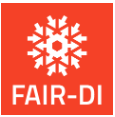Speaker
Description
Atom Probe Tomography (APT) is widely used for nanoscale structure and composition characterization across various disciplines, including materials science, geosciences, and biological sciences. Therefore, it is essential to have standardized workflows for analysis and post-processing that can combine software tools from different research communities in an interoperable manner. We demonstrate this by combining two distinct software tools, paraprobe-toolbox and CompositionSpace, developed within the FAIRmat and NFDI-MatWerk consortia, respectively, for APT data analysis. The integration of these tools enables the characterization of composition and structural features of interfaces in an alloy.
To ensure interoperability and reproducibility, these tools are made accessible through community code registries such as conda-forge. Furthermore, meticulous recording of details such as the used software and their corresponding versions, the computational environments, the execution order of different workflow steps, and provenance is required. These requirements lead to the need for FAIR computational workflows, which combine both FAIR software and data principles with extended requirements to ensure reproducibility, reuse, and repurposing. We employ pyiron as a workflow management tool and demonstrate its use for the analysis of data from APT experiments. pyiron provides a Jupyter notebook-based, user-friendly platform for users to compose workflows, significantly reducing the entry barrier for using and combining different software tools. Additionally, the workflows can be exported to other widespread workflow description languages such as Common Workflow Language, Snakemake, and NextFlow. The results from the APT analysis workflows are annotated according to an open description, and provenance records are maintained. Advanced visualization tools for APT results are also provided.
This initiative showcases the collaborative efforts of the NFDI-MatWerk and FAIRmat consortia, illustrating how user-friendly, interoperable, and reusable tools can be created. By establishing FAIR workflows for APT, we take a crucial step towards automating FAIR data production and advancing reproducible scientific analyses in this field.
